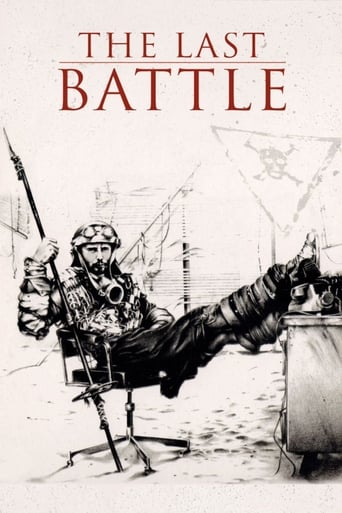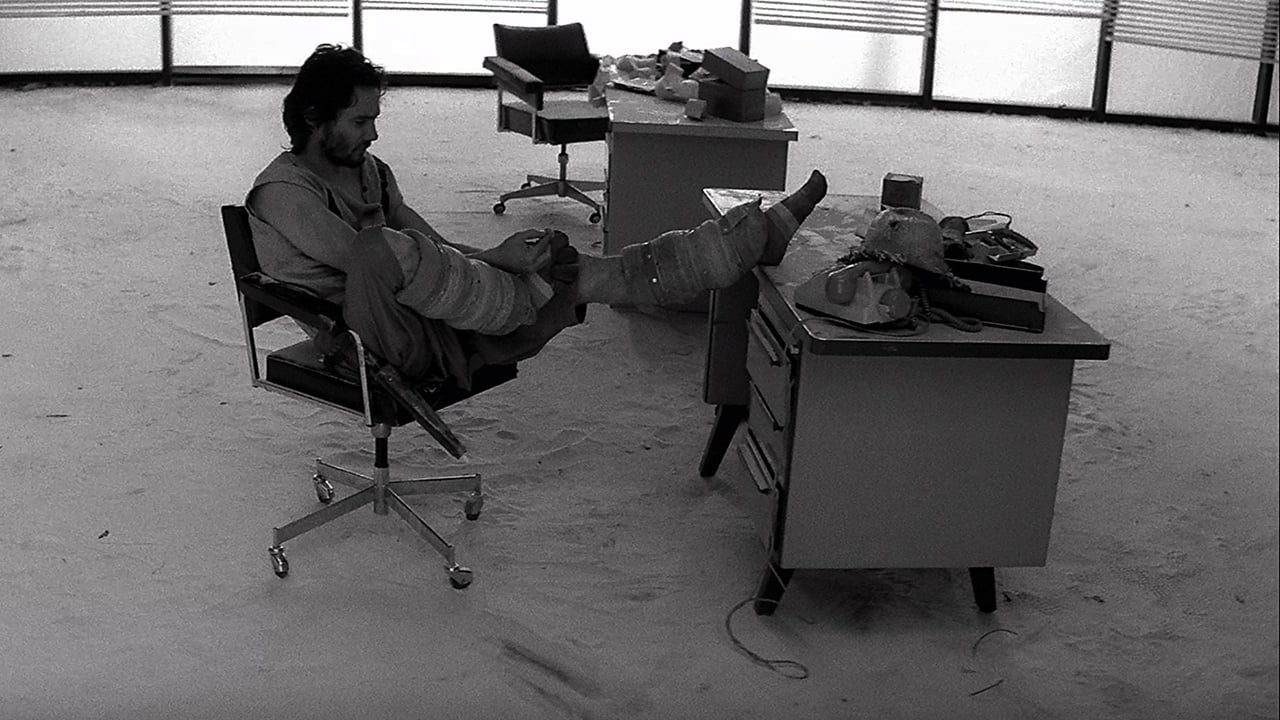rawkmonster
If there's one thing the history of cinema has repeatedly pressed upon us, whether consciously or not, it is that physical beauty is superior. From an evolutionary standpoint, this makes perfect sense as it's how we're programmed. We are made to want the best genes for our children in order to ensure that the species continues as fit and healthy as possible, and physical appearance is the most immediate indicator of genetics.We see this again in Luc Bessons 'Le Dernier Combat' (The Last Battle). Pierre Jolivet is our nameless hero, identified in the credits as 'The Man'. Our storyline is a Hollywood standard. Our hero meets up with the nameless antagonist (identified in the credits as 'The Brute') played by Jean Reno, more on him in a moment. Our hero loses the battle, sustaining injuries but managing to escape. He stumbles upon a third nameless character (identified in the credits as 'The Doctor'), and the pair strike up an unlikely friendship while our hero is nursed back to health. Friend of the hero, who is intelligent and sophisticated but genetically inferior, is killed, leaving our hero to face the final showdown, which he naturally wins, leaving him to rule over all while getting the girl. As a French film rather than Hollywood, it's not always quite as simple as this, there are many subtleties and allegories, and all the characters have a kind of comic existentialism.Our hero Jolivet is lithe and toned, with deep, dark searching eyes. In his pursuit of the woman he is refined, presenting a neatly-wrapped gift, combing his hair. Our villain Reno, by contrast, is shown at one stage in his underpants, hairy chest with his belly hanging over. He wears glasses, an indicator of his genetic inferiority, and to further force home the impression he is given facial scarring.Our third character Bouise is the intelligent sophisticate. Painting, cooking, enjoying fine wine, repelling Reno with the wry humour of his multiple defensive barriers. He is older, weaker. He has glasses and funny teeth, but is apparently aware of his inferior position and doesn't attempt to impose himself on the woman. His role is the facilitator for our hero. When he removes our hero's blindfold, indicating he can now visit the woman without restriction, our facilitator is symbolically sacrificing himself for the hero, which is made literal a few moments later when he is killed by falling debris on the way.As a Hollywood film, this wouldn't have been anything special. But it's French, so we instead have many delights in store. Reno's character is not given the Hollywood villain treatment, despite his apparently psychopathic single-minded desire to destroy everyone in sight. The roles are instead enforced in more comedic ways; Jolivet takes a double hob to attach to his gas canister, but when Reno repels him and is sitting at his symbolic throne, not only does the gas run out, but the tape recorder which has worked perfectly up until now suddenly decides to break down, not by running out of batteries but by inexplicably chewing up the cassette. Reno is such a wonderful and likable actor that we are never entirely against him. Similarly, our hero is never entirely heroic; in the film's first scene we are shown him having sex with a blow-up doll, only to be foiled in his designs by a deflation.Another thing Hollywood would and could never have done is to make an entire film containing only one word of dialogue, a broken "bon.... jour" which is spoken by Bouise and Jolivet to each other. We are dropped into a post-apocalyptic world where nothing is explained (which is as it should be, I feel), least of all why people are now incapable of speech, except in that one moment under the influence of some inhalation. Bouise is the symbol of the old world, civilisation, empathy, artistry. Our hero is shocked to hear speech, but desperately wants to join; the jubilation when he is finally able to is quite touching. In his spare time, our hero appears to enjoy listening to music and looking at paintings, compared to Reno's pursuit of practicing smashing bottles with a sword. While our hero dines on cooked fillets, Reno is seen stuffing raw fish into a bubble gum dispenser. The aforementioned scene of gas and tape recorder failure can be viewed as Reno's attempt to join that civilised world, but his brute ignorance leads to inevitable failure; he cannot be what he isn't. He is the barbarian trying to assume the role of King.The remaining world is one of shattered buildings and improvised weaponry, apparently engulfed by a vast desert. Our hero is seen early on with a lance with a knife tied to the end of it, and some padded 'armour'. Reno has similar padded protection and wanders around with a sword. Even Bouise comes out to attack Reno at the gate wielding an improvised crossbow. All this medieval weaponry lends itself neatly to Bouise painting our hero in the guise of a knight on the wall. Later, Bouise adds the female figure; is this to suggest the chivalric approach he would like our hero to take with the woman? If so, the wrapped gift suggests that it has worked, leading to Bouise's approval with the blindfold removal. In the end he doesn't get the girl, as Reno has gotten to her first, and apparently killed her in his insane villainy.We are then given a final scene of our hero flying back to his original location. Here he kills the leader and assumes command, dressed no longer as the noble knight, but now in the clothes reflecting the position he will take here... the white suit of a gangster. But he's still our noble hero because he immediately frees the bizarre gimp-like water slave, and is rewarded by being lead to a woman. They both smile, and we have our happy ending.
Vincent
This is a quirky film. It is a mixture of serious and funny sections.The plot is very flimsy, not much happens from start to finish.There is a little action, the fight scenes are well done and have flashes of humour.The acting is OK, there is no dialogue so the actors don't have too much to do.The first part of the ending, the one involving the doctor and the thug, is quite will done, there are a few surprises and some interesting scenes.The second part of the ending is less convincing and doesn't make much sense.Watchable for the weirdness but no real quality.
mattymatt30
I'm afraid that although I started viewing Le Dernier Combat wanting to like it,(because I'm a fan of post apocalyptic films like The Matrix, Omega Man, The Road Warrior, etc...),this film just doesn't deliver. It's very odd, but not in a good way. People for some reason can physically no longer speak. OK. No subtitles to read. The visuals are not very interesting, and being in black and white may be more because of the film's low budget than an artistic choice. Bright colours has been Luc Besson's choice since he has the budget to use them. The film is so spare as it is, that colour may have given it that extra bit of interest it lacks, if simply to dazzle the eye. Would the Road Warrior have been the same in black and white? The story too, is not that compelling. The characters lack depth, because of the absence of dialogue, and their actions often seem quite unusual and off the wall. I can see where this film will have it's fans because it may be considered more artistic than others of its genre, but the art is again another attempt to hide the films major shortcomings. That said, art is in the eye of the beholder, so see it and decide for yourself!
markjephson
I am not an expert on film and saw this only by accident on TV years ago. Without knowing the title or director I have been trying to find out what it was ever since. I have just stumbled across it in my local video rental shop and it is just as I remembered. To me a film does not have to be completely original ( mad max, lack of dialogue ) or super fast, have everything explained or even add to 'our understanding of human nature' to be enjoyed. My advice is to sit back, relax and watch this to the end.


 AD
AD



